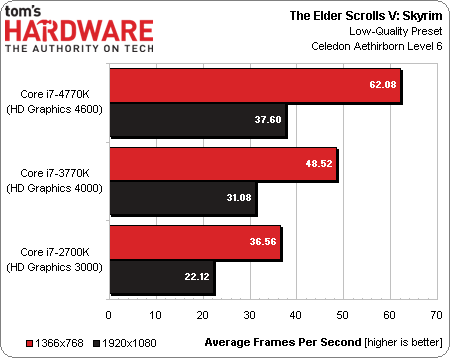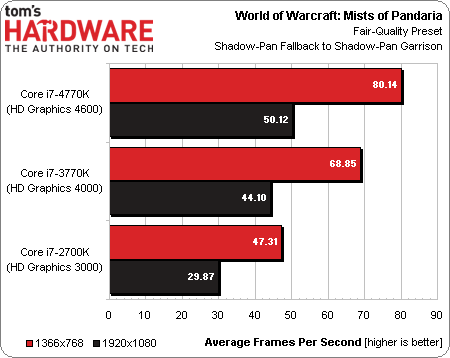Core i7-4770K: Haswell's Performance, Previewed
A recent trip got us access to an early sample of Intel’s upcoming Core i7-4770K. We compare its performance to Ivy Bridge- and Sandy Bridge-based processors, so you have some idea what to expect when Intel officially introduces its Haswell architecture.
Results: HD Graphics 4600 In Skyrim And WoW
Despite the early nature of our hardware and software, it’s likely that you still won’t be able to game comfortably at 1920x1080 on an HD Graphics 4600-equipped processor. A title like Skyrim will probably be accessible at 1366x768, even on a lower-end chip than the Core i7-4770K. An almost-30% speed-up is certainly commendable, particularly from a 25% increase in graphics resources (plus some frequency) compared to Ivy Bridge’s GT2.
Nevertheless, the Trinity-based A10-5800K currently looks faster still, achieving more than 45 FPS at 1920x1080 in this same test.
Although WoW is commonly derided for its age and cartoonish graphics, it remains a popular title. And the Core i7-3770K handles it pretty well at 1366x768, averaging almost 70 FPS. Our Core i7-4770K sample is about 16% quicker at the same resolution, easily qualifying as playable.
It’d even appear to do pretty well at 1920x1080, though we’ll caution that the experience is far less pleasant than a sustained 50 FPS. And this is taken from a flight path in Pandaria. You’d be completely slammed in a raid situation. AMD's A10-5800K, averaging more than 60 FPS at 1920x1080, is currently much more playable.
A Little Context On Graphics
How will these results affect our next comparison between Intel’s CPUs and AMD’s Richland-based APUs? The first thing we have to remember is that Core i7-4770K will likely be a $300+ processor (and that most enthusiasts who buy one will use discrete graphics, rather than on-die). So, while it’d appear that Haswell’s GT2 implementation could get Intel close to Trinity's performance, at least in traditionally platform-bound games like Skyrim and WoW, remember that price-competitive models won’t be as fast as our -4770K.
I want to wait for Intel's final silicon and drivers before putting AMD into the same charts as Haswell-based chips, but based on the numbers I've been running, it appears likely that processors equipped with GT2 will come up short against AMD's fastest APUs on the desktop.
Get Tom's Hardware's best news and in-depth reviews, straight to your inbox.
Almost certainly, however, a (mobile) part with twice as many execution units and 128 MB of L4/eDRAM at 1.2 GHz would blow Trinity out of the water in games. A comparison to Richland probably won't change much there. And we'll likely need to wait until 2014 to see how Kaveri affects AMD's position.
Current page: Results: HD Graphics 4600 In Skyrim And WoW
Prev Page Results: HD Graphics 4600 In Hitman And DiRT Next Page A Taste Of Things To Come…On The Desktop-
twelve25 Obviously with AMD striggling, Intel has no need to really stretch here. This is another simple incremental upgrade. Good jump from socket 1156, but I doubt many 1155 owners will feel the need to buy a new motherboard for this.Reply -
EzioAs Thanks for the preview!Reply
So all of these results are what most people expected already: minimal increase in CPU performance while the iGPU shows significant increase? I'm not surprised really (and I believe most people have speculated this), since Haswell mostly targets the mobile segment.
@twelve25
In my opinion though, unless LGA1156 i5/i7 users really want to upgrade (native USB 3.0, more SATA 3, etc), they can still hold out with their current CPUs. Although upgrading to Haswell rather than IB does make much more sense if they really want to but there's also the reported USB 3.0 bug and we haven't seen the thermals and overclocking capability on this chip so it might actually be a turn off for some people. And yeah, I don't think many SB or IB users will upgrade to Haswell. -
dagamer34 @twelve25 But who does Intel really need to convince here? Trying to chase after people who upgrade every year is a fools errand because its such a small piece of the pie compared to the overall larger market. Besides, most of Intel's resources are clearly going towards making mobile chips better, where there energy really needs to be anyway.Reply -
dagamer34 To add to EzioAs's point, I don't see most people on SB/IVB systems upgrading until Intel makes chips that have a good 10-15% better performance than 4.2-4.5Ghz SB/IVB systems or they decide to go down the APU route like AMD is (and also find/create workloads which an APU would beat those systems). In other words, not for another 2+ years.Reply -
Adroid killerchickensDoes Haswell run hot as Ivy Bridge?That = the million dollar question. Did they do away with the bird poop and return to fluxless solder.Reply
Intel should stop throwing insults to the overclocking crowd. We will pay another 10$ for the fluxless solder. -
mayankleoboy1 @ Chris Angelini : Man, you are amazing for this preview! +1 to Toms.Reply
There is no surprise at Intel excluding TSX from the unlocked K parts. They removed teh VT-d in the Sb/IB too. Just so that people not use teh $300 chip in servers, but have to buy th e$2000 chip.
Intel are fucked up
i dont think Intel will be too happy with Toms for this preview.... -
sixdegree Good preview. I kinda hoped that Toms includes the power consumption figure for Haswell. It's the biggest selling point of Haswell, after all.Reply -
mayankleoboy1 sixdegreeGood preview. I kinda hoped that Toms includes the power consumption figure for Haswell. It's the biggest selling point of Haswell, after all.Reply
Power consumptions is a lot dependent on the BIOS optimizations, which are far from final.


